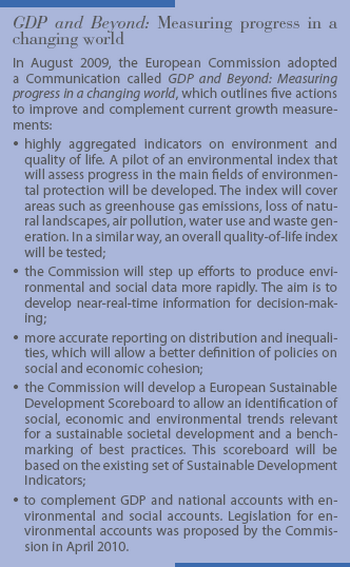Archive:European Commission goes beyond GDP
- Published in Sigma - The Bulletin of European Statistics, 2010/02

In August 2009, the European Commission adopted a Communication called GDP and Beyond: Measuring progress in a changing world (COM final 433/2009), which outlines a number of actions to improve and complement current growth measurements. Sigma spoke to Robin Miège, Acting Director of the Environment Directorate’s General Strategy Directorate, and Oliver Zwirner from the Chief Economist, Instruments and Impact Assessment Unit, to find out more about the Commission’s work in the area.
Introduction
The GDP and Beyond Communication concludes that it is important to complement the current GDP in order to answer the political challenges of the 21st century and to steer EU policies towards green growth and a low-carbon, resource-efficient and inclusive society.
‘Our quality of life depends on social relations, environmental quality, freedom and safety, accumulated wealth, income and leisure time, risks and ex pectations for the future – such as fearing the loss of wealth or income or other elements of good living conditions, e.g. a healthy environment. Therefore, we need to measure personal wellbeing and societal welfare in addition to measuring the goods and services produced for the market in a given year,’ Mr Miège said.
Environmental and social information needed

The Communication argues that environmental and social outcomes need to be measured and assessed separately from economic output, as the link between economic growth and well-being is not always automatic.
‘We have a strong tradition of looking at economic issues, stemming from the fact that improving our economic situation also improved our social situation in the past. In a globalised world with environmental constraints – soon inhabited by nine billion people – links between economic, social and environmental issues are more complex,’ said Mr Miège.
Complementing GDP with information on environmental and social developments might also be more informative for citizens.
‘Information on social and income situation of households, on health and education is more easily readable than complex macro-economic indicators. One needs quite a specific theoretical background to interpret indicators such as gross domestic product or net national income correctly. The Stiglitz-Commission is rightly pointing to the fact that there is an increasing gap between what is reported by official statistics and what citizens, business or local administrations experience,’ Mr Miège said.
To close that gap, he suggested an intensive producer-user dialogue, which would make statistics better fit for purpose and therefore increase usability and use of data.
Environmental Index and Sustainable Development Scoreboard
The GDP and Beyond Communication outlines five actions (see box below) to improve the measurement of progress in society. The Environment Directorate-General (DG) is responsible for developing an environmental index and a sustainable development scoreboard.
‘The environmental index will most likely be an index on pollution or environmental stress in general. Its goal is to complement other macro-indicators, such as GDP or unemployment, by providing information on the level of ‘pressure’ exerted on our environment by the activities taking place in the EU. Therefore, the lower the index, the better our interaction with our environment,’ said Mr Zwirner.
This index is ultimately aimed at policymakers, journalists and citizens who are also following the development of indicators such as GDP and unemployment.
‘The analysis of this composite indicator, together with the other two key indicators, would provide a more global picture of the development in society than the sole use of GDP,’ Mr Zwirner said.
The sustainable development scoreboard aims to inform citizens and politicians in a concise way about the major trends on progress towards sustainable development.
‘The design of such an easily understandable, but still information-rich tool puts a considerable challenge to us. One particular point is that many issues related to sustainable development are not yet sufficiently covered by official statistics, e.g. on biodiversity or eco-innovation. Therefore, the inclusion of data from non-official sources will be one important feature of this scoreboard,’ he continued.
The Commission does not believe that the development of another sustainable development measure, besides the existing sustainable development indicators (SDIs), risks confusion for users.
‘Indicators are a communication tool. And communication tools always target a specific audience. The existing SDIs are the monitoring tool for the specific objectives of the EU sustainable development strategy. This set was created to assist SD experts in ministries to monitor the achievement of such targets. In addition to that, we need a more communication-oriented tool to inform non-experts about the key issues on sustainable development,’ Mr Zwirner said.
Environmental accounts welcome
Mr Miège said that we need to remind ourselves that all economic activity depends essentially on natural resources.
‘Not a single business comes to my mind that does not use natural resources. Even such typical service providers as hairdressers use iron for scissors, water, shampoo either based on mineral or palm oils, energy, etc.,’ he explained.
One step on the way was the adoption by the Commission of a proposal for a Regulation on Integrated Environmental Economic Accounting in April 2010. The Environment Directorate-General (DG) is also happy that steps are taken at UN level to make the integrated environmental economic accounting an international statistical standard.
Not yet directly mentioned in the Beyond GDP road map, but a related issue emerging from the Europe 2020 strategy adopted in March this year, is the accounting of natural resources, including eco-system services and indicators on the resource efficiency of the economy. The full elaboration of wealth or asset accounts could contribute to an adequate basis for this endeavour.
‘However, we cannot wait a decade before first decisions on the transition to a resource-efficient economy are taken. Therefore, a kind of fast-track implementation of broad measurement concepts to provide first orientation points for this journey would be most useful for policymaking,’ said Mr Miège.
A key issue, according to the GDP and Beyond Communication, is to improve timeliness of social and environmental statistics to the level of key economic indicators.
Reuse and data linking one way forward
According to the Commission, existing data sources need to be analysed and information linked and reused. Data from national accounts and social surveys could be combined to give new insights into social and economic inequalities.
‘Trade data could, for example, provide information on potential environmental degradation and use of natural resources in other countries,’ Mr Zwirner said.
‘We could also explore the use of new technologies, such as remote sensing, in order to get more information on some environmental issues, such as land-use change or marine pollution. We might also explore new cooperation between the public and private sectors for issues that are hard to grab for official statistics, such as the quality of nature, including biodiversity, venture capital invested in eco-innovation and market penetration of eco-efficient products,’ he continued.
‘Spending money on good data is an investment’
Another key issue, according to the Communication, is to improve timeliness of social and environmental statistics to the level of key economic indicators.
‘The application of now-casting techniques could contribute towards overcoming the current restrictions. Only if complementary data on the social, economic and environmental situation are available at the same time, will they be taken up by the media, public debate and policy analysis. This will certainly support an integrated and balanced approach to solve societal problems,’ Mr Miège said.
‘Similarly, better information on distribution and inequalities will foster public decision-making. Most political debates are about fair sharing of efforts and benefits, such as financial reforms or the upcoming transition to a resource-efficient economy. With good data at hand, these discussions can be led in a more rational way,’ he added.
‘In essence, we might need to understand more and more that spending money on good data and indicators is an investment in a solid information basis for rational and transparent democratic decision-making. Good data are quite likely cheaper than flawed public and private decisions,’ Mr Miège concluded.
Further Eurostat information
Publications
- SIGMA - The Bulletin of European Statistics, 02/2010: GDP & Beyond; Focus on measuring economic development and well-being
- Sustainable development in the European Union - 2009 monitoring report of the EU sustainable development strategy
Database
- Indicators
Dedicated section
Other information
- GDP and Beyond: Measuring progress in a changing world (Commission Communication COM final 433/2009)

